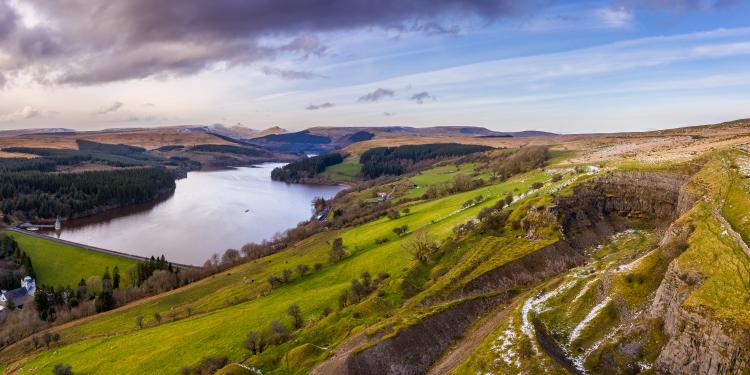Wales Climate Week returns with focus on local action for a climate-resilient future

Why local action takes centre stage at this year’s Wales Climate Week
Wales Climate Week kicks off today, bringing together climate decision-makers, stakeholders, and communities from across the nation to explore solutions for tackling and adapting to climate change.
The virtual conference, from November 11-15 and coincides with the United Nations 29th Conference of the Parties (COP29) and serves as a platform for discussions on how Wales can reduce the impact of climate change.
The Welsh Government are using the event to highlight how the public sector is already playing a key role in reducing emissions and working towards a more sustainable, resilient future for communities across the country.
With increasing heatwaves, droughts, storms, and floods threatening both the environment and infrastructure, Wales Climate Week will explore how homes, businesses, and communities can adapt to these growing challenges.
Attendees will delve into how action within Wales, alongside international efforts, can strengthen the resilience of our food systems, natural resources, and built environments, preparing us for the impacts of a changing climate.
Public sector leadership key to achieving Wales’ net zero ambition
The Welsh Government’s focus on supporting public sector initiatives is central to its ambitious net zero goals. By funding a range of high-impact sustainability projects through schemes like Re:fit, Wales Funding Programme and the Recycling Fund, Wales is demonstrating how public sector leadership can drive systemic change.
As the Welsh Government prepares to engage with global stakeholders at COP29, these efforts showcase how local leadership can have a profound impact on tackling the climate crisis, both within Wales and beyond.
Key sustainability projects showcasing Wales' commitment to climate action Newport city council
Newport City Council is leading by example with a £1.4 million investment from the Welsh Government’s Re:fit scheme, aimed at enhancing energy efficiency across key public buildings such as the Riverfront Theatre and the Regional Pool and Tennis Centre. These upgrades will reduce carbon emissions by 342 tonnes annually, while energy-saving measures like LED lighting and smart energy systems will cut consumption by up to 30%. This project highlights how local government initiatives can make significant strides toward achieving net zero goals, creating long-term benefits for both the environment and the community.
Aberystwyth University
Aberystwyth University has embraced sustainability in a way that benefits both students and climate resilience. The university is implementing energy-efficient technologies across 18 buildings at its Gogerddan campus, with funding from the Re:fit scheme.
The installation of LED lighting is expected to save up to 75% of energy costs while improving study environments for 2,000 students. In addition, the National Plant Phenomics Centre is using LED grow lights to advance research on climate-resilient crops—critical work that will help ensure food security in a changing climate. Aberystwyth’s ambition is to generate 20% of its electricity from on-site renewable sources by 2025, moving toward its goal of 25% by 2030.
South Wales Fire and Rescue Service
The South Wales Fire and Rescue Service is taking action to reduce its carbon footprint, starting with a £87,000 investment in solar panels at the Barry Emergency Service Station. This initiative will cut carbon emissions by approximately 7.83 tonnes annually and represents the first of many sustainability projects planned across the service’s stations. The Service is also working with local contractors to ensure that these projects create jobs and economic opportunities in the region.
Torfaen County Borough Council
Torfaen County Borough Council has used funding from the Welsh Government’s Recycling Fund to carry out energy-efficient upgrades at key community sites, including the Pontypool Active Living Centre and Cwmbran Stadium. These projects are not only cutting carbon emissions but also improving safety and the overall experience for local residents. LED lighting upgrades at Cwmbran Stadium, for example, have improved visibility in previously poorly lit areas, helping prevent accidents and ensuring that the stadium continues to serve as a hub for local sports.
A future focused on sustainability and climate adaptation
As Wales Climate Week continues, it’s clear that the public sector’s role in the fight against climate change is indispensable. Through innovative funding schemes and forward-thinking projects, the Welsh Government is helping to build a climate-resilient Wales that leads by example. From energy-efficient upgrades and the use of renewable energy to cutting-edge research and community-level climate action, Wales hopes its efforts will contribute to global sustainability and that it can create a greener more resilient future for everyone.
The lessons shared this week, alongside the insights gained from the COP29 conference, will be key in guiding future climate policies and practices. The eyes of the world are on the decision-makers. And as Wales continues to progress on its path toward net zero, it believes that international collaboration and local leadership will be fundamental in addressing climate change.
To register for Wales Climate Week or learn more about the event and ongoing climate efforts across Wales, visit Wales Climate Week.




